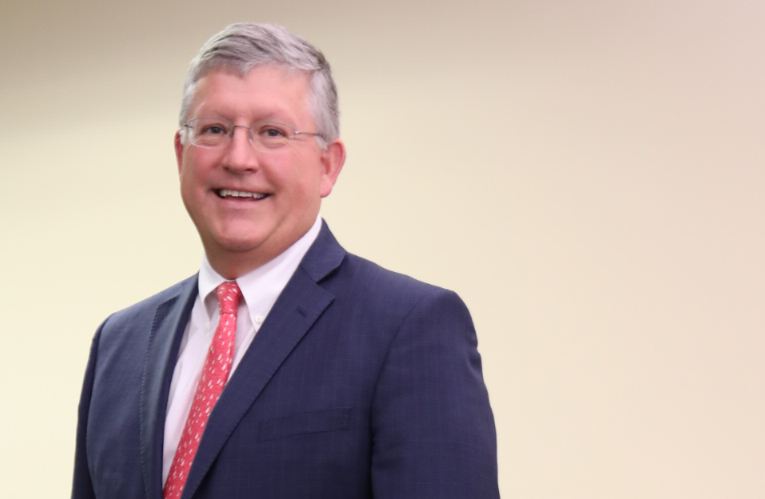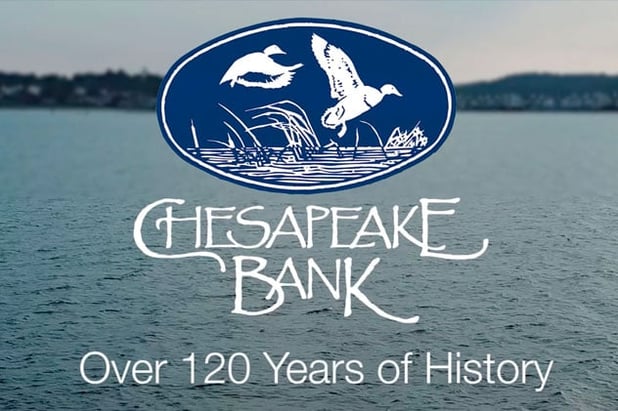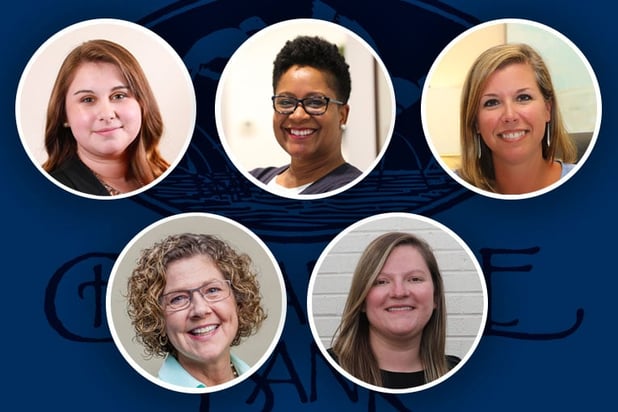- Home
- It's All About Community
- Chesapeake Bank Blog
- Our CEO Sets the Cultural Tone That Makes Chesapeake Bank Special

Our CEO Sets the Cultural Tone That Makes Chesapeake Bank Special
This pre-COVID interview with our President and CEO, Jeff Szyperski falls right in line with other culture-themed articles we’ve shared recently. While it is older, it’s a testament to our culture and also to his role as a leader.
We met with Jeff in January 2020 to collect his thoughts after he served a year term, as chairman of the American Bankers Association (ABA). The interview was part of a campaign to celebrate our 120th anniversary last April. However, COVID canceled our branch events.
We often hear, from those who have met Jeff, “we love him.” He is funny, down to earth, and has a gift for breaking complicated things into simple terms. You’ll see what we mean, below.
CB: Let’s talk about where you started. Coming to work at Chesapeake Bank, was it what you expected?
JS: It was very different. At the time, we were around $150 million (in assets). I was blissfully ignorant that I had come to work for a bank in the middle of a recession. The first three years (the early 1990s) were very difficult. Banking was very different from accounting, my former career. So, aside from the difficulty with the recession and the intense regulatory scrutiny, the rest of it pretty much went as expected.
CB: Considering your background in accounting and coming to work for your father-in-law, Doug Monroe, did you expect that you’d be here this long?
JS: I expect that I did. I’m a “drive the same car until it gets too many miles on it” kind of person. I don’t like to throw away old suits because they’re like old friends. This is only my second job.
But in all seriousness, the hope was that it would be long term. It could have easily not worked out. I was more interested in a career. In Raleigh, where Wende [Jeff’s wife] and I lived previously, all of the sections of our life were very segmented and compartmentalized. I was looking to find someplace with better integration of personal life, business life, church life. Here, everything is intersected.
CB: What do you think makes our culture so different?
JS: We don’t just pay lip service about caring for our fellow employees, we actually do care. Wende and I were just talking about this vignette on Facebook. In it, you see an MBA student taking his final exam. The only question on the exam is, “What’s the name of the janitor you’ve walked by every day on the way to this class?” That whole vignette sort of misses the point. You’ve either got the natural inclination to talk to that person or not.
We do a good job of hiring people who have their ducks in a row and care about the right things. We want to make money and represent shareholders well, but the way that we do it is by getting the right employees on the bus. We do a good job of fostering that and creating a family atmosphere. We don’t do it because people appreciate it. We do it because that’s who we are. Everyone is highly capable, too. Our culture of caring about people is genuine and a firm bedrock to this organization.
In some instances, it’s been hard to fill positions because we were looking for a type of person. So we’ve had to put a position on hold until there was a right fit, but that has paid off for us.
CB: Would you say that’s what makes you most proud of this organization?
JS: Absolutely. There used to be times when I’d go out, and someone would come up and I would say, “oh no…” But that never happens now. Now, people say, “I just wanted to let you know that I went into your branch last week…” and I know that something good will come after that. That wasn’t always the case. Collectively, our employees exude that.
CB: What would you say has contributed the most to your personal growth in this organization?
JS: Seeing people develop. Without naming anyone, certain folks have plateaued in certain positions, and with appropriate challenges, they have gone to a different level. And considering the “lifelong learning culture,” it’s edifying to see that.
When you see someone reach where they thought they were going to go, and you go, “No, no, no, you’re a lot better than that” or “You can do this!” And to see people tentatively try it and do it, then go, “Well, what else can I do?” There are a lot of people in this organization who have done that. That develops me, personally, to see that.
That’s why we do the whole Center for Creative Leadership (CCL) for senior management because we had done a great job getting training together for everyone else on staff, but we weren’t as good as we could be because we lacked training for senior management. That initiative took senior management to a definite area of discomfort for all of us on the team as a result of some of the feedback we were given, individually, and collectively.
I’ve said to that group, my year as ABA chairman would have been materially different if we had not done that training. We were all working so well together. So, while I was away [serving my ABA term], senior managers all worked it out. They are their own team and they know that. That has also helped me to see that, over the long haul, development actually works.
A couple of our officers have even said that experience through CCL has been life-changing. If they’re better personally, they’re better corporately, too.
CB: Because community service is so important to our organization, what are some of the more significant volunteer experiences that you’ve had?
JS: While serving as ABA chair, I had to unwind the non-profit stuff that I did locally because the capacity wasn’t there. I miss that. Before that, I felt plugged in. That’s good for me.
I’ve been chair of Chesapeake Academy. About half of students there are on some form of financial aid. So, it’s not “a little rich kid” school. Their fundraising is perpetual.
I was chairman of Rappahannock Westminster-Canterbury (RWC) ten years ago. Likewise, I didn’t realize the philanthropic side of the organization and how they make it affordable for people to get in there too. There is such a charitable aspect.
The YMCA is the same. I was chairman before we had the current facility. They serve such a need. Seventy-two percent of the kids in our school system in Lancaster County come from a family below the poverty level. The YMCA doesn’t turn anyone away because of their ability to pay. They do a lot of heavy lifting.
There are so many important causes out there. My heart is really in non-profits that support people.
CB: People tend to be afraid of stepping out of their comfort zones or speaking up because they are afraid of making mistakes. Are there any professional blunders that you’d like to share?
JS: One of my gifts is conveniently forgetting those. Susan [Dameron, his secretary] could probably tell you a hundred of them.
In all seriousness, it sounds so trite, but only when you’re making mistakes do you figure out a better way.
So, as far as blunders, earlier on with the bank, I was trying to get a lot more done on my own rather than delegating. It’s been a slow walk to learn from that.
As far as other blunders, I think I’ve just blacked those out. I move on. The two most worthless emotions to have are regret and worry. When you regret something, you apologize for it, move on, and try to improve. Continuing to regret doesn’t do anyone any good. And worry -- half of it’s not going to happen anyway. So be present.
CB: From a heritage standpoint, as an organization, are there things historically that you’d like to see passed down?
JS: I am not sure that I think that way. I am cognizant that whoever follows me in this role will do it very differently than I do. So, from a heritage standpoint, I would hate to say that you must do “this.” It goes back to delegating. The next person may do something far better. When you’re building heritage or legacy, they can become millstones around people’s necks if they’re looking to take things in a different direction.
Culturally, I don’t think anyone is going to come in and change our corporate values. Even if they tried, it would take a long time, and they would probably get a lot of blowback if they tried to unwind those. I don’t think anything else is sacrosanct. Don’t hold anything so precious that if it were not there, it would rock our world.
CB: Compared to rising technology-based financial companies (FinTechs), and other competitor mergers, why do you think our being around 120 years matters?
JS: When we did the 100th celebration, one of the takeaways was that our longevity was a lot more important to us than it was to the outside world. If you’re a customer, maybe it matters we’ve been around for 20 years. Once you pass that, I don’t think it matters that much. We’re proud of it, but I think it matters more to us than the outside world. I think the fact that we have been around 120 years does show that we can adapt. The tenure itself doesn’t matter as much to me. The fact that we’re not one of those 10,000 banks that has gone away is important; we’re part of the 5,000 that have remained. That shows that we can compete.
CB: What is the pitch that you’d give someone who wanted to work at Chesapeake Bank?
JS: When I do the orientation for new employees, I ask them as an ice breaker, “What made you want to come work for us?” Increasingly so, in the 15 years that I’ve asked that question, the answer is, “I have a good friend who works here and they love it,” or they were a customer and loved how they felt when they walked into one of our branches.
So, if you asked me why you should work here, I’d say, “go ask any of our employees. They’ll tell you.”
CB: A few members of senior management are creeping up in age toward retirement. Is succession planning a big topic?
JS: We have a formal plan for everyone who’s part of senior management. It’s presented to the board on a semi-annual arrangement. It’s always a work in progress, and it’s not just for retirement. Some people may not stay until retirement, so we pay particular attention to those positions. But we look at every single member of this team. Our long-term plan tries to identify someone internally who can replace each person. The multi-year plan looks five to seven years in the future in some cases.
Becky Foster is the best example. We knew that John Hunt was approaching retirement. We worked probably seven years to get her ready to assume his responsibilities. She’s done a great job.
Then once she became our greatest success story, she immediately became our greatest weakness. Because when she stepped up, it was hard to consider who might fill her shoes because she was so young. It’s more of an art than a science.
In closing
So what exactly is company culture? In the words of Jeff, “it’s the hardest thing to nail down, categorize and quantify, but at the same time, it’s the most important.”
“Culture” is the collective voices and attitudes of people who may not share the same ideas or experiences but have the same goals.
When we say “it’s all about community,” it’s not lip service. We continue to ask the question internally, “how are we doing?” Then, we solicit feedback company-wide.
Employees become stakeholders when they realize their input matters. Including diverse perspectives ensures that we are growing as an organization and are mindful of the ever-changing needs of all we serve.
If this sounds like an environment you’d like to be a part of, we have openings.
-
Categories
Posts by Topic
- Business (98)
- It's All About Community (73)
- Personal Finance (70)
- CFS News (49)
- Employees (46)
- Northern Neck (37)
- Middle Peninsula (34)
- Chesapeake Payment Systems (27)
- Richmond (26)
- Williamsburg (20)
- Fraud & Security (17)
- Home Buying (12)
- Chesapeake Wealth Management (11)
- Flexent (11)
- Customer Testimonials (7)
- COVID-19 (6)
- Chesterfield (5)


